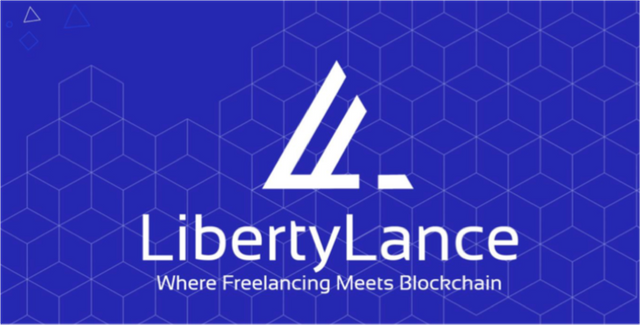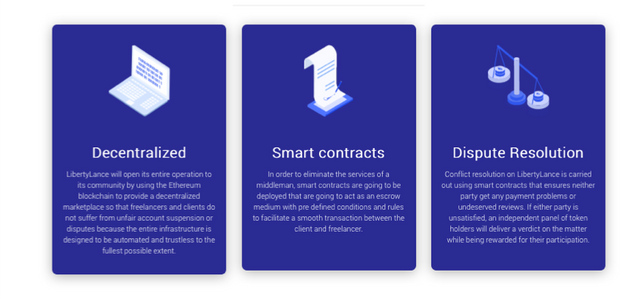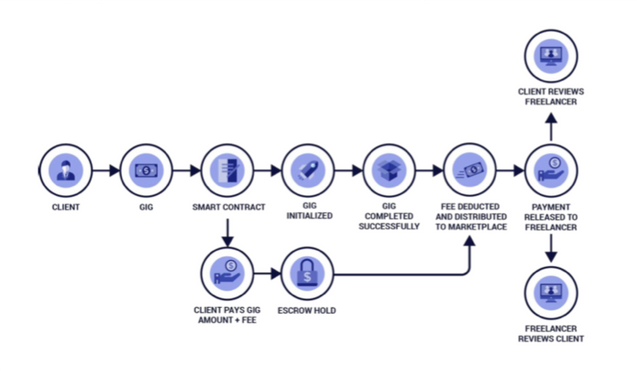Remote work gains popularity among people of different professions, so many translators, tutors, repairmen, doctors prefer business for themselves. The interaction with clients passes through the intermediaries (exchanges) or directly, that’s why the rights and interests of freelancers and customers are often violated.

Picture 1. LibertyLance. All advantages of blockchain for freelancers
How can blockchain help in the solution of the problem? LibertyLance is a platform created on the basis of smart contracts for working with freelancers. A customer publishes a task, a certain amount of funds is blocked on his account, and a freelancer does this work and receives his money.
What is LibertyLance?
The platform automates making technical tasks for freelancers, allows them to discuss openly the quality of done work, to pay works quickly or return money to a customer.

Picture 2. Merits of LibertyLance: the platform is decentralized, works with smart contracts and resolves disputes between parties
The developers have taken into account all stages of the freelancers’ employment procedure.
● Problem statement. Smart contracts describe terms of the work and the amount of the payment. If a task is nontrivial, the blockchain will “care” about all the terms of the agreement to be done.
● Acceptance of works. “Frozen” money is automatically debited from an account after a task is taken, allowances or deductions are calculated on the basis of a smart contract. Such an approach protect both a customer and a freelancer against fraud.
● Arguments about the work done. If a customer or a freelancer is not satisfied with the cooperation, a dispute is resolved by third-party users of LibertyLance who have tokens. Decision making and a vote are opened. A party submitted a claim must pay 2% commission of task’s price.
● Delays or cancellation of an order. If a customer or a freelancer cannot connect with each other after a deadline, frozen money and 2% penalty go to the offended party, the order is closed.
The developers strive to reduce the number of disputes between customers and freelancers, so the losing party pays a 2% penalty, which is allocated to the winning party and the participants of the vote. Such an approach brings down the number of fraudsters in the system.
How does LibertyLance work?
Voting Decision system, which is an opened vote in the case of disputes, is in the basis of the platform. The conflict between a customer and a freelancer is judged by other users. Every participant gets remuneration or penalty for his vote.
● An anonymous open vote among the nine authorized members. LibertyLance users must have at least $200 on their accounts to vote with tokens in controversial cases. Judges are automatically chosen by the system on the basis of their experience and reputation. They make a closed-door decision on the dispute. Those, who voted for the winner, receive an award, and others pay a fine.
● The KYC procedure for every member. New users must upload personal documents to the system (a passport copy, a driving license copy) and the proof of residence. Such an approach excludes duplication of accounts in the system, "fake" users distorting results of the voting.
● The system of rewards and sanctions. Delays, sudden cancellation of an order, neglecting the terms of a smart contract are punished by fines. Such an approach excludes irresponsible and unfair users, reduces the number of conflicts between the parties.

Picture 3. The work of LibertyLance: a client deposits funds before placing an order, both parties receive feedback
LibertyLance gives customers and freelancers the ability to cooperate without intermediaries and to choose any terms of a bargain and an amount of payment. Smart contracts take into consideration the peculiarities of tasks, automatically debits funds and guarantees the security to both parties. The rating system on LibertyLance includes anonymous votes of members, so customers and freelancers will be protected against the unfair rivalry.
How is the ICO of LibertyLance going? What will be with the project next?
The LTH tokens are issued on the basis of Ethereum according to ERC20 standard. During the ICO 50 million tokens will be sold. The developers are planning to raise 5,5 thousand ETH. 1 coin costs 0,0002 ETH. Every investor gets 5-15% of the investment.
Issued LTN is allocated in proportion:
● 55% of tokens will be sold during the ICO;
● 20% of tokens will stay on developers’ accounts;
● 13% is a LibertyLance reserve.
● 12% will be spent during the Pre-sale, Private Sale, and also the Bounty program.
Raised funds are planned to spend in the following proportion:
● 35% compensate the costs of the future development of the platform, the adaptation of LibertyLance to users’ needs;
● 35% are costs of marketing and product promotion;
● 20% are planned to be spent on the administration costs and legal support of the project;
● 10% is a company reserve.

Picture 4. Demo edition of LibertyLance on the project website
The development of the project started in September 2017. The MVP of LibertyLance was run in March 2018. The demo edition of the platform is available on the official website. Token sales start in June 2018 (Private Sale), the ICO is planned in July. The first version of LibertyLance will be released in the third quarter of 2018, an app for smartphones will be created in a year.
**Summary **
The LibertyLance platform is a decentralized app for a secure work of freelancers. Why is the project good for investors? It has the working MVP, cooperates with a large consulting company Low&Trust International, and has no minimum investment amount. Will the project succeed? LibertyLance has already been supported by 53 thousand users.
Many competition already in this area. It will bring much better quality of average service.
Downvoting a post can decrease pending rewards and make it less visible. Common reasons:
Submit